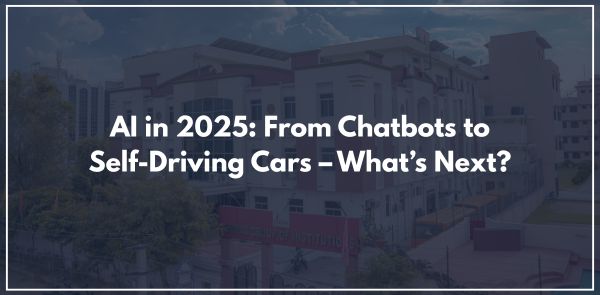
The year 2025 has been a watershed moment for artificial intelligence (AI). From the explosive popularity of chatbots like ChatGPT to the incremental yet groundbreaking progress in autonomous vehicles, AI is reshaping industries, economies, and daily life. As the technology evolves at breakneck speed, several questions emerge. What breakthroughs define this era? Where are we headed next? And what challenges must we confront to ensure AI’s responsible development? Let’s explore the state of AI in 2025 and dive into its transformative future as we prepare students at Poddar College, a top-ranked BCA college in Jaipur, for the opportunities and challenges ahead.
Chatbots dominated the AI narrative in 2025, with OpenAI’s GPT-4.1, Google’s Gemini, and Meta’s Llama 4 pushing the boundaries of what conversational AI can achieve. These systems, powered by large language models (LLMs), have evolved from clunky text generators to sophisticated tools capable of drafting legal documents, writing code, and even offering emotional support.
Key Advancements:
Impact and Controversies: While chatbots have revolutionized sectors like education and customer service, concerns persist. Issues like “hallucinations” (AI generating false information), copyright disputes over training data, and the potential for job displacement in creative fields remain unresolved. Governments and companies are scrambling to implement safeguards, but the line between innovation and risk remains blurry.
Self-driving technology has inched closer to mainstream adoption in 2025, though not without setbacks. Companies like Waymo, Tesla, and Cruise have expanded their robotaxi services, while legacy automakers like Ford and GM doubled down on autonomous R&D.
Breakthroughs in 2025:
Challenges: High-profile accidents, including a Cruise robotaxi dragging a pedestrian in October, sparked regulatory crackdowns and eroded public trust. Technical hurdles like handling unpredictable weather or construction zones persist, delaying widespread deployment. Meanwhile, debates rage over liability in crashes and the ethical “trolley problem” of how AI should prioritize lives in no-win scenarios.
As chatbots and autonomous vehicles mature, innovators are exploring new frontiers. Here’s what to watch in 2025 and beyond:
1. Generative AI Goes Multisensory
Text-to-image tools like MidJourney and DALL-E 3 were just the beginning. The next wave includes:
2. AI in Healthcare: Beyond Diagnostics
AI is moving from analyzing MRIs to enabling proactive care:
3. Embodied AI: Robots That Learn Like Humans
“Embodied AI” refers to systems that learn by interacting with the physical world. In 2025, companies like Figure AI and Boston Dynamics unveiled robots that assemble furniture, fold laundry, or navigate warehouses autonomously. By combining LLMs with sensory input, these robots could soon handle complex tasks in homes and hospitals.
Learn more about robotics with a BCA course in Jaipur. Explore BCA and related courses at Poddar International College to advance with hands-on training and workshops.
4. Climate AI: Fighting Global Warming
From optimizing energy grids to monitoring deforestation, AI is becoming a climate ally:
As AI’s capabilities grow, so do concerns about ethics, privacy, and inequality. Key issues in 2025 include:
Regulatory frameworks are struggling to keep pace. The EU’s AI Act, enforced in 2024, classifies AI risks and bans manipulative systems, while the U.S. leans on sector-specific guidelines. However, global collaboration is lacking, risking fragmented standards.
AI in 2025 is both awe-inspiring and imperfect. Chatbots dazzle us with their wit yet falter under scrutiny. Self-driving cars promise safer roads, but technical and ethical roadblocks remain. As we venture into the future, the focus must shift from raw innovation to responsible stewardship.
The future of AI lies not just in smarter algorithms but in harnessing their power to address humanity’s greatest challenges—climate change, healthcare inequity, and education access. At Poddar College, the best MCA college in Jaipur, we are dedicated to equipping our students with the knowledge and skills necessary to navigate this evolving landscape. By balancing ambition with ethics, we can ensure AI evolves from a disruptive force into a trusted ally, shaping a future where technology serves all.
What is the future of AI in 2025?
AI will grow manyfold in the future in terms of the AI models' performance, security, and profitability. With Tesla's Robotaxi, generative AI developments, and artificial intelligence revolutionizing robotics, we have several new innovative ideas ready to be introduced.
Will AI replace jobs in the future?
According to the World Economic Forum's Future of Jobs Report 2025 about 40% of employers look to reduce their workforce in domains where AI can reduce tasks. However, due to AI, new types of jobs will also be created. These will include AI trainer, AI Ethics Trainer, AI Product Manager, etc.